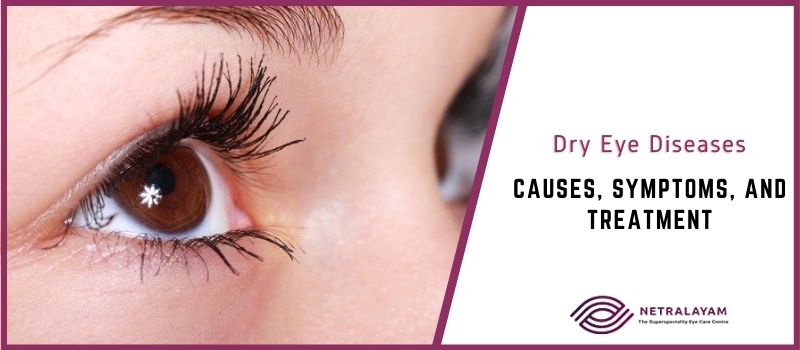Committed to Eye Care with Compassion, Technology and Competency
Committed to Eye Care with Compassion, Technology and Competency

6/21/2021
Dry eye diseases are very common health conditions in several parts of the world. According to recent reports, up to a third of adults over 65 years of age suffer from this disease. It has also been found that people with mild symptoms are less likely to report them to the doctor. In contrast, those with the most severe symptoms are more likely to experience a negative impact on their functioning and work productivity.
The various dry eye symptoms are:
The main causes of dry eyes are as follows:
In this condition, the lacrimal glands of the eyes are unable to manufacture enough middle aqueous layer of tears, resulting in low tear production.
This disease occurs when tears start to evaporate quickly as the eyes' meibomian glands don’t produce a strong outer lipid layer of tears.
It’s a common and complicated condition that affects the ocular surface.
This disease causes dryness of the conjunctiva and cornea and adversely impacts the quality and quantity of tears.
LASIK surgery can impact the tear dynamics resulting in ocular surface desiccation. This can lead to complications like dry eyes.
Common methods for treating dry eyes include:
Dry eye drops (artificial tears) can help lubricate the eyes that may bring relief for a short time. Remember that such eye drops contain preservatives usually meant to prevent the growth of bacteria once the multidose vial is opened. Dry eye drops are typically packed in such containers. There are non-preservative eye drops as well that contain fewer additives. This option is best for people who are allergic to particular ingredients in eye drops.
Severe symptoms require a prescription from an eye doctor. You can use an immune-suppressing drug like Restasis (cyclosporine) or take Xiidra (lifitegrast) that can, according to medical experts, adequately manage dry eyes. You can use corticosteroid eye drops to reduce inflammation or opt for a tear-stimulating drug, like cevimeline, to improve dry eyes symptoms.
If you have dry eyes, you can go for procedures that close the tear drainage holes in the inner corners of eyelids. This allows the limited volume of tears to remain on the eyes longer. The tear drainage holes are closed either temporarily (with tiny plugs) or permanently (with surgery).
There are many home remedies and tips that can help treat dry eyes disease like:
You can increase the intake of Omega-3. Fish and flax seeds have been proven to decrease the symptoms of dry eyes. You can also take supplements or eat foods that contain high levels of fatty acid.
Vitamins like Vitamin D, Vitamin A, and B12 are essential to cure dry eyes. Eat a healthy, balanced diet containing a variety of vegetables, fruits, meat, and dairy products rich in these vitamins. Vitamin supplements are also effective.
Drink plenty of water throughout the day to ensure that the eyes produce enough tears to combat dry eyes.
Avoid alcohol as it causes dehydration and can affect the quality of tears.
Relax your eyelids with a warm compressor to cleanse the eyelids and improve the oil flow through the eyelid glands.
Consult your doctor if you are taking prescription medicine for another disease to check if dry eyes might be a symptom of the concerned drug.
Never direct hair dryers, fans, or heaters directly to your eyes.
Please visit us at Netralayam, the super-specialty eye care centre, in Kolkata if you need treatment for dry eyes or are facing any symptoms for the same. You can also contact our medical team if you have any related queries.
Yes. These include inflammation, abrasion of the corneal surface, corneal ulcers, and vision loss.
As per recent studies, the best eye drops to treat dry eyes are Refresh Optive Lubricant Eye Drops, Systane Balance, Sooth XP, and Refresh Celluvisc Lubricant Eye Gel.
According to recent studies, improvement of dry eye symptoms happens within two weeks of treatment.
Yes, it can cause blindness if left untreated for a very long time.
Comments are closed
